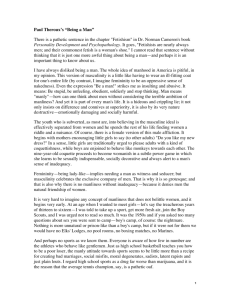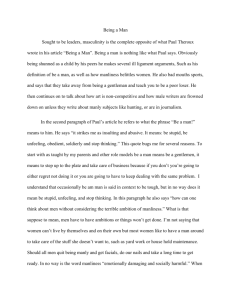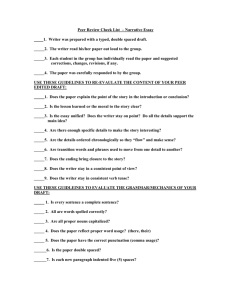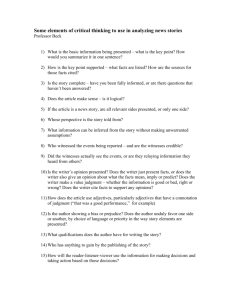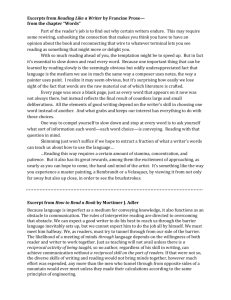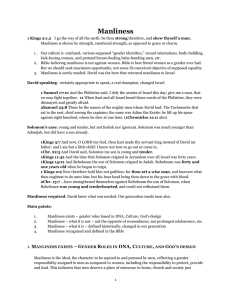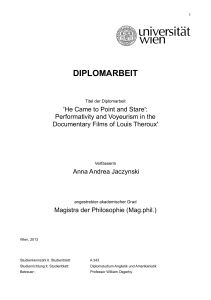Being a Man - West Ada School District
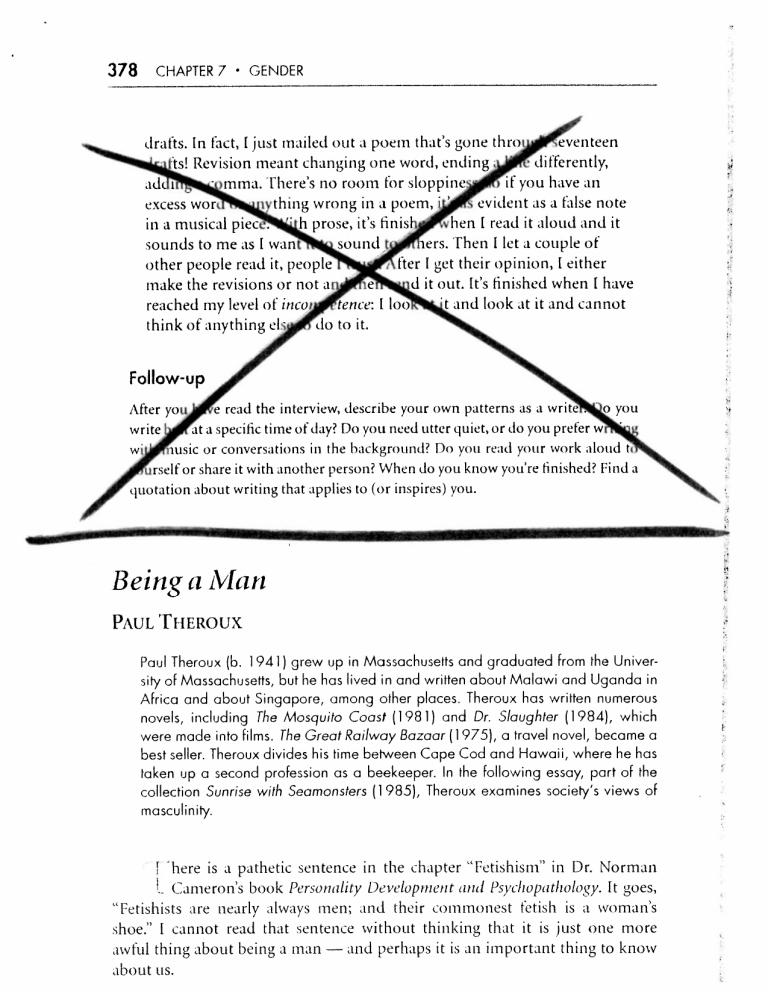
378 CHAPTER 7 GENDER drafts. In fact, [just mailed out a poem that’s gone thro its! Revision meant changing one word, ending eventeen differently, ad i rnma. Iheres no room br sloppinc ii you have an excess wo ything wrong in a in a musical piece.
h prose, it’s poem,L
‘ evident as a false note
Finish vhen I read it aLoud and it sounds to me as L want sound t, iers. Then I let a couple ot other people read it, people tter I get their opinion, I either make the revisions or not a e d it out.
It’s finished when I have reached my level of think of anything eI mcvi tence: I loo ‘t and look at it and cannot
/ do to it,
Follow-up
After yot write read the interview, describe your own patterns as a write
.
0 OU at a specific time of day? Do you need utter quiet, or do you prefer w
W IUSiC Of conversations in the hickgrnimnd? Do von read your work aloud t( irselfor share it with another person? When do you know you’re linished? Find a
)uotation about writing that applies to (or inspires) you.
-
Being a Man
PAUL THERoUx
Paul Theroux (b. 1941) grew up in Massachusetts and graduated from the Univer sity of Massachusetts, but he has lived in and written about Malawi and Uganda in
Africa and about Singapore, among other places. fheroux has written numerous novels, including The Mosquito Coast (1981) and Or, Slaughter (1984), which were made into films. The Great Railway Bazaar (1 975), a travel novel, became a best seller. Theroux divides his time between Cape Cod and Hawaii, where he has taken up a second profession as a beekeeper. In he following essay, part of the collection Sunrise with Seamonsfers (1 985), Theroux examines society’s views of masculinity.
“I2etishists are nearly always men; and their commonest fetish is a woman’s shoe.” I cannot read that sentence without thinking that it is just one more awful thing about being a man
— and perhaps it is an important thing to know about us.
here is a pathetic sentence in the chapter ‘Fetishisrn” in Dr. Norman
Cameron’s 1)00k Personality Development anti Psychopathology. It goes,
I have always disliked being a man, The whole idea of manhood in America is pitiful, in my opinion. This version of masculinity is a little like having to wear an illfitting coat ior ones entire life (by contrast, I imagine femininity to be an oppressive sense of nakedness). Even the expression “Be a man!” strikes me as insulting and abusive, It means: Be stupid, be unfeeling, obedient, soldierly and stop thinking. Man means “manly”
— how can one think about men without considering the terrible ambition of manliness? And yet it is part of every man’s life. It is a hideous and crippling lie; it not only insists on difference and connives at superiority, it is also by its very nature destructive
— emotionally damaging and socially harmful.
I he youth who is subverted, as most are, into believing in the masculine ide 11 is Jftetivdv separated from women and he spends the rest of his life finding women a riddle md a nuisance of course, there is a female version of this male affliction lt begins with mothers encouraging little girls to say (to other adults) Do you like my new dress?” In a sense, httle girls are traditionilly urged to please adults with a kind of coquettishness, hi1e boys are enjoined to behave like monkeys towards each other The nme-year-old coquette pro ceeds to become womanish in a subtle power game in which she learns to be sex ually indispensable, socially decorative and always alert to a man’s sense of inadequacy
Femininity
* being lady-like
— implies needing a man as witness and se ducer, but masculinity celebrates the exclusive company of men That is why it is so grotesque, and that is also why there is no manliness without inadequacy
— because it denies men the natural friendship of women
It is very hard to imagine any concept of manliness that does not belittle women, and it begins very early At an age when I wanted to meet girls
— let’s say the treacherous years of thirteen to sixteen
—
I was told to take up a sport, get more fresh air, join the Boy Scouts, and I was urged not to read so much It was the 1950s and if you asked too many questions about sex you were sent to camp
— boy’s camp, of course the nightmare Nothing is more unnatural or prison-like than a boy’s camp, but if it were not for them we would have no Elks’
Lodges, no pool rooms, no boxing matches, no Marines
And perhaps no sports as we know them Everyone is aware of how few in number are the athletes who behave like gentlemen Just as high school basketball teaches you how to be a poor loser, the manly attitude towards sports seems to be little more than a recipe for creating bad marriages, social misfits, moral degener ates, sadists, latent rapists and just plain louts I regard high school sports as a drug far worse than marijuana, and it is the reason that the average tennis cham pion, say, is a pathetic oaf
Any objective study would find the quest for manliness essentially right wing, puritanical, cowardly, neurotic and fueled largely by a fear of women It is also certainly philistine There is no book-hater like a Little League coach But indeed all the creative arts are obnoxious to the manly ideal, because at their best
380 CHAPTER 7 GENDER the arts are pursued by uncompetitive and essentially solitary people. It makes it very hard for a creative youngster, for any boy who expresses the desire to be alone seenis to be saying that there is something wrong with him.
It ought to be dear by now that I have something of an objection to the way we turn boys into men. It does not surprise me that when the President of the United States has his customary weekend off he dresses like a cowboy—.
it is both a measure of his insecurity and his willingness to please. In many ways, American culture does little more for a man than prepare him for mod eling clothes in the L. L Bean catalogue. I take this as a personal insult because for many years I found it impossible to admit to myself that I wanted to be a writer. It was my guilty secret, because being a writer was incompatible with being a man.
There are people who might deny this, but that is because the American writer, typically, has been so at pains to prove his manliness that we have come to see literariness and manliness as mingled qualities. But first there was a fear that writing was not a manly profession
— indeed, not a profession at all. (The para dox in American letters is that it has always been easier for a woman to write and for a man to be published.) Growing up, I had thought of sports as wasteful and humiliating, and the idea of manliness was a bore. My wanting to become a writer was not a (light from that oppressive role-playing, but I quickly saw that it was at odds with it. Everything in stereotyped manliness goes against the life of the mind. The Hemingway personality is too tedious to go into here, and in any case his exertions are well-known, but certainly it was not until this aberrant behavior was examined by feminists in the L960s that any male writer dared question the pugnacity in Hemingway’s fiction. All the bullfighting and arm wrestling and dc phant shooting diminished Hemingway as a writer, but it is consistent with a pre vailing attitude in American writinç one cannot be a male writer without first proving that one is a man.
It is normal in America for a man to be dismissive or even somewhat apolo getic about being a writer. Various factors make it easier. There is a heartiness about journalism that makes it acceptable
— journalism is the manliest form of
American writing and, therefore, the profession the most independent-minded women seek (yes, it is an illusion, but that is my point). Fiction-writing is equated with a kind of dispirited failure and is only manly when it produces wealth a money is masculinity So is drinldng. Being a drunkard is another assertion, if misplaced, of manliness. The American male writer is traditionally proud of his heavy drinking. But we are also a very literal-minded people. A man proves his manhood in America in old-fashioned ways. He kills lions, like Hemingway; or he hunts ducks, like Nathanael West or he makes pronouncements like, “A man should carry enough knife to defend himself with,” as James Jones once said to a Life interviewer. Or he says he can drink you under the table. But even tiny drunken William Faulkner loved to mount a horse and go
Kercuac fox hunting, and Jack roistered un and down Manhattan in a lumberiack shirt (and soent
•T.
1
p
L t t every night of ‘liar Sultrrraawtans’ with his mother in Queens).
And we are famil— jar with the lengths to which Norman Mailer’ is prepared, in his endearing way, to prove that he is just as much a monster as the next man.
When the novelist John Irving was revealed as a wrestler, people took him to be a very serious writer; and even a bubble reputation like Erich (Love Story)
Segal’s was enhanced by the news that he ran the marathon in a respectable time.
How surprised we would be if Joyce Carol Oates were revealed as a sumo wrestler or Joan l)idion active in pumping iron. “Lives in New York City with her three children” is the typical woman writer’s biographical note, for just as the male writer must prove he has achieved a sort of muscular manhood, the woman writer
— or rather her publicists
— must prove her motherhood.
There would be no point in saying any of this if it were not generally accepted that to be a man is somehow
— even now in feminist-influenced America
— a privilege. It is on the contrary an unmerciful and punishing burden. Being a man is bad enough; being manly is appalling (in this sense, women’s lib has done much more for men than for women). It is the sinister silliness of men’s fashions, and a clubby attitude in the arts. It is the subversion of good students. It is the so called “Dress Code” of the Ritz-Canton Hotel in Boston, and it is the institution alized cheating in college sports. It is the most primitive insecurity;
And this is also why men often object to feminism but are afraid to explain why: of course women have a justified grievance, but most men believe
— and with reason
— that their lives are just as bad.
the Text
Exploring
1. What is the effect of the opening paragraph? Does it encourage you to read on?
Does it provoke you? Does it intrigue you?
2. So much of this essay consists of negative descriptions of what it means to Paul
Theroux to be masculine or a man. Why does he offer such strong images and assertions?
3. Note the parenthetical comments. What do they contribute to the essay? Are they rhetorically effective, or could they have been omitted?
4.
How does Theroux prepare his readers for the turn the essay takes in paragraph 12 when he says, “There would be no point in saying any of this if it were not gener ally accepted that to be a man is somehow
— even now in feminist-influenced
America
— a privilege.” What does this reveal about Theroux’s overall purpose in this piece?
‘The Subterraneans is a 1960 film based on Jack Kerouac’s novel about the lifestyle of 1950s
Beats.—Eds.
2
—
Eds.
br Bedford/St. Mart in’s
I )cvt’lopnico tot Iatilor: No han ( )dell
‘(lilor
I l;n tivi,
Editor: Irwin Zucker
1 ‘rocliictwn iiper1lsor: Andrew lnsor hirkt’tinc. PvIa titic’t’r: I )an id
Mc Do nough lrt 1)iret wr: Lny
Kriknrian i’xt I)esigri: Iand,i Ni. Robertson
( opy Editor: Patricia I >hela n
Indexer: K i rsten Kite
Photo Research: I lelane Prottas
( over l)esicn: I )onna [ce I )ennison
Cover :tr t:
[he ( ay
Sew oce, it 13. Kitaj.
It B. Kitaj, courtesy, Marlborough (;allerv, New Yrk.
“
Bolton Museum and Art Callery, lancashire, U K
( olnpo3ition: Strattord/lex Fech
I’rintiig and Binding: It it Donneiley & Sons Company
I’resident: Joan E. Feinberg
Editorial Director: Denise B. Wydra
Editor in thief:
Karen S. I lenry
/ )jretor of I)L’vclopinent:
Frici ‘F. Appel
Director / Marketing: Karen Melton Soeitz
I )irector of bIitin, Design, and Production: Marcia Cohen
Managing Editor: Shuli Iraub
Library of Congress Control Number: 2007924372
Copyright ) 2008 by Bedford/St. Martin’s
All rights reserved. No part of this book may be reproduced, stored in a retrieval system, or or otherwise, except as may be expressly permitted by the applicable recording, transmitted in any form or by any means, electronic, mechanical, photocopying, copyright statutes or in writing by the Publisher.
Manufactured in the United States of America,
12 13 1 15 11 It)
[yr uiforniatwn, write: Bedford/St. Martin’s, 75 Arlington Street, Boston, MA 021 16
(o 17— 599—3000)
ISBN-lU: 0-312-45094-X
ISBN-iS: 978-0-312-45094-0 lckiiorvledgnierits
Acknowledgments and copyrights are included at the hack of the book on pages 1015—1021, which constitute an extension of the copyright page.
It is a violation of the law to reproduce these selections by any means whatsoever without the written permission of the copyright holder.
